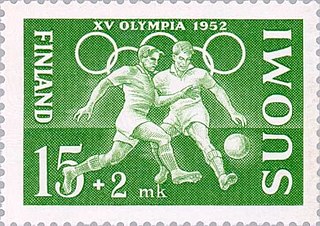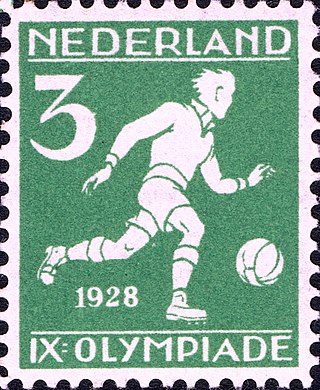
The 1934 FIFA World Cup was the second edition of the FIFA World Cup, the quadrennial international football championship for senior men's national teams. It took place in Italy from 27 May to 10 June 1934.

The 1938 FIFA World Cup was the third edition of the World Cup, the quadrennial international football championship for senior men's national teams and was held in France from 4 June until 19 June 1938. Italy defended its title in the final, beating Hungary 4–2. Italy's 1934 and 1938 teams hold the distinction of being the only men's national team to win the World Cup multiple times under the same coach, Vittorio Pozzo. It would be the last World Cup until 1950; the 1942 and 1946 World Cups were cancelled due to World War II.

The 1978 FIFA World Cup was the 11th edition of the FIFA World Cup, a quadrennial international football world championship tournament among the men's senior national teams. It was held in Argentina between 1 and 25 June.

Basketball at the 1936 Summer Olympics was the first appearance of the sport of basketball as an official Olympic medal event. The tournament was played between 7 August and 14 August 1936 in Berlin, Germany. 23 nations entered the competition, making basketball the largest tournament of the team sports, but Hungary and Spain withdrew, meaning 21 competed.
Football at the 1924 Summer Olympics was the sixth edition of the football tournament at the 1924 Summer Olympics held in Paris.

The Olympiastadion is a sports stadium at Olympiapark Berlin in Berlin, Germany. It was originally built by Werner March for the 1936 Summer Olympics. During the Olympics, the record attendance was thought to be over 100,000. Today the stadium is part of the Olympiapark Berlin.

Italy competed at the 2004 Summer Olympics in Athens, Greece, from the 13th to the 29th of August 2004. The country has competed at every Summer Olympic games in the modern era, except for the 1904 Summer Olympics in St. Louis. The Italian National Olympic Committee sent the nation's largest ever delegation in history to the Games. A total of 364 athletes, 229 men and 135 women, competed in 27 sports.
A total of 37 teams entered the 1938 FIFA World Cup qualification rounds, competing for a total of 16 spots in the final tournament. For the first time the title holders and the host country were given automatic qualification. Therefore, France, as the hosts, and Italy, as the defending champions, qualified automatically, leaving 14 spots open for competition.

Peru has officially participated in 19 Summer Olympic Games and 3 Winter Olympic Games. They did not send any athletes to the 1952 Summer Olympics. The Peruvian Olympic Committee is the National Olympic Committee for Peru which was founded in 1924 and recognized by the International Olympic Committee in 1936.

The Football tournament at the 1952 Summer Olympics was won by Hungary.

Football was one of the tournaments at the 1928 Summer Olympics. It was won by Uruguay against Argentina, and was the last Olympic football tournament before the inception of the FIFA World Cup, which was held for the first time in 1930.
Football at the 1936 Summer Olympics was won by Italy. After the introduction of the first FIFA World Cup in 1930, competing nations would from now on only be permitted to play their best players if those players were amateur or where professional players were state-sponsored. However, since amateur players were counted as senior squad players, their results would be still counted as senior side's results until 1992.

Sweden competed at the 1936 Summer Olympics in Berlin, Germany. 171 competitors, 163 men and 8 women, took part in 84 events in 17 sports.

The Empire of Japan competed at the 1936 Summer Olympics in Berlin, Germany. 179 athletes competed in 13 sports and also participated in art competitions. In art competitions, Japan won 2 bronze medals by Ryuji Fujita in paintings and also Sujaku Suzuki in drawing and water colours. As the country hosted the next Olympics that was supposed to be held Tokyo before cancellation, a Japanese segment was performed at the closing ceremony.
The football tournament at the 1960 Summer Olympics was held from 26 August to 10 September in 1960 throughout Italy. The tournament featured 16 men's national teams from four continental confederations. The 16 teams were drawn into four groups of four and each group played a round-robin tournament. At the end of the group stage, the first-ranked teams of each group advanced to the semi-finals, and culminating with the gold medal match in Rome on 10 September 1960.
Peru v Austria was a football match played on 8 August 1936 during the Summer Olympics at Hertha Platz in Berlin. The match became notable for causing controversy after it was annulled because of a pitch invasion from Peruvian supporters who had assaulted the Austrian players. Peru had three of its five extra time goals disallowed by the referee and ended up winning the match 4–2.
The 2011–12 season of Hertha BSC began on 31 July 2011 with a DFB-Pokal match against ZFC Meuselwitz, and ended on 15 May 2012 with the second leg of the Bundesliga relegation play-offs. For the first time since 2006–07, Hertha made it past the 2nd round of the DFB-Pokal, making it as far as the quarterfinals before losing to Borussia Mönchengladbach. In the Bundesliga, Hertha finished 16th, qualifying for the relegation play-off.
The final tournament of the 1934 FIFA World Cup was a single-elimination tournament involving the 16 teams which qualified for the tournament. The tournament began with the round of 16 on 27 May and concluded with the final on 10 June 1934. Italy won the final 2–1 for their first World Cup title.
The final tournament of the 1938 FIFA World Cup was a single-elimination tournament involving the 16 teams which qualified for the tournament. The tournament began with the round of 16 on 4 June and concluded with the final on 19 June 1938. Italy won the final 4–2 for their second World Cup title.

Peru Olympic football team represents Peru in international football competitions in multi-sport events such as the Olympic Games and the Pan American Games. The selection is limited to players under the age of 23, except three overage players. The team is controlled by the Peruvian Football Federation (FPF). Peru has participated in two Olympic football tournaments, one Pan American football tournament, and 7 Bolivarian football tournaments under this category.













